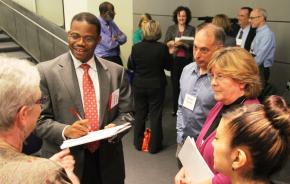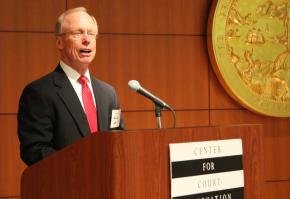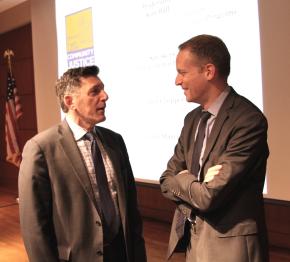SAN FRANCISCO —Participants from more than 75 U.S. jurisdictions and 10 countries gathered in San Francisco for Community Justice 2014, an international summit on how to reduce crime and incarceration while improving public trust in justice.

The Center for Court Innovation hosted the summit in partnership with the U.S. Department of Justice's Bureau of Justice Assistance and the California Administrative Office of the Courts.
Denise O’Donnell, director of the Bureau of Justice Assistance, delivered the first day’s keynote address.
O’Donnell said that the Bureau of Justice Assistance has evolved its mission in recent years “to focus more holistically on justice system reform.” In addition to community courts, she highlighted a number of other Bureau of Justice Assistance initiatives that are advancing the idea of community justice, including the Byrne Criminal Justice Innovation Program, Crime Prevention through Environmental Design, Improving Courtroom Communication, and an effort to create new assessment tools for misdemeanor offenders.
“We see reducing recidivism and reducing unnecessary confinement as going hand in hand with making our communities safer,” O’Donnell said.
Conference participants hailed from a wide range of programs, from the Midtown Community Court in Manhattan, which opened 20 years ago, to “Safer Together,” a newly-launched initiative of the San Francisco District Attorney’s Office that addresses neighborhood-level crime in the Eastern Bayview neighborhood.
Among the speakers were California Lt. Governor Gavin Newsom and leading criminal justice researchers Edward J. Latessa, a professor at the University of Cincinnati, and Tracey Meares, of Yale Law School. Latessa spoke about evidence-based approaches to alternatives to incarceration, highlighting the eight risk factors that are most strongly associated with recidivism. (For more on evidence-based strategies for misdemeanor offenders, click here.)

Meares spoke about procedural justice, describing the large body of research that has shown that when defendants and litigants perceive that the justice system is fair, they are more likely to comply with court orders and follow the law in the future. (For more on procedural justice, click here.)
Michael Botticelli, acting director of the White House Office of National Drug Control Policy, addressed the summit on the second day. Botticelli noted that law enforcement plays a “crucial role to ensure we have safe communities” but is also coming to recognize that the problem of addiction has significant public health dimensions.
“I get to talk to a tremendous number of local law enforcement officers who will say, ‘You can’t arrest your way out of the problem. We have to partner with public health.’”

Botticelli’s office is supporting innovative strategies to divert addicts from the justice system. He cited overdose prevention programs, community courts, and drug courts, among others.
A key characteristic of community justice is community engagement, which involves building meaningful bridges between justice agencies and the neighborhoods they serve. "Community engagement is hard work but helps sustain any community-based project," said Julius Lang, director of Training and Technical Assistance for the Center for Court Innovation.
The summit concluded with a discussion of international efforts to plan and operate community justice projects, featuring reports from Australia, England, Mexico, New Zealand, Ireland, Israel, and Singapore.
To see the complete summit agenda, click here. View the supplemental materials here.
Twitter coverage of the summit used the hashtag: #CommunityJustice2014.

Related Podcasts
Evidence-based Practices, Reducing Unnecessary Incarceration are Priorities for Bureau of Justice Assistance -- An interview with Bureau of Justice Assistance Director Denise O'Donnell.
Evidence-based Practices, Reducing Unnecessary Incarceration are Priorities for Bureau of Justice Assistance
How Procedural Justice Strengthens the Public's Willingness to Obey the Law -- An interview with Tracey L. Meares, the Walton Hale Hamilton Professor at Yale Law School.
How Procedural Justice Strengthens the Public's Willingness to Obey the Law
Deploying Public Health Strategies to Address Drug Addiction -- An interview with Michael Botticelli.
Deploying Public Health Strategies to Address Drug Addiction
After 5 Years, the San Francisco Community Justice Center Continues to Adapt -- An interview with Judge Braden C. Woods.
After 5 Years, the San Francisco Community Justice Center Continues to Adapt
Thoughtful Implementation is Essential for Evidence-based Practices to Succeed -- An interview with Professor Edward J. Latessa.
Thoughtful Implementation is Essential for Evidence-based Practices to Succeed
Minimizing the Collateral Consequences of a Conviction -- An interview with Chief Judge Timothy C. Evans.
Minimizing the Collateral Consequences of a Conviction
Improving Outcomes by Assessing the Impact of Trauma on Offenders -- An interview with Kathleen West.
Improving Outcomes by Assessing the Impact of Trauma on Offenders
Los Angeles City Attorney Says Listening is Key to Developing Effective Community-Based Programming -- An interview with Los Angeles City Attorney Mike Feuer.
Los Angeles City Attorney Says Listening is Key to Developing Effective Community-Based Programming
Related Videos
Greg Berman: Remembering Alfred Siegel
Greg Berman, director of the Center for Court Innovation, reflects on Alfred Siegel's contributions to the field of justice reform at Community Justice 2014.
Denise O'Donnell: Community Justice 2014
Denise O'Donnell, director of the Bureau of Justice Assistance, delivers opening remarks on the first day of Community Justice 2014.
Gavin Newsom: Community Justice 2014
In keynote remarks at Community Justice 2014, California Lt. Governor Gavin Newsom draws a parallel between community justice and internet innovations like Craig's List and Uber, praising them for their the bottom-up, customized approaches to doing business.
Is Procedural Justice the Secret Ingredient? Tracey L. Meares at Community Justice 2014
Tracey L. Meares, the Walton Hale Hamilton Professor at Yale Law School, presents on "Procedural Justice: The Secret Ingredient?" at Community Justice 2014.
Michael Botticelli: Community Justice 2014
In his keynote address at Community Justice 2014, Michael Botticelli, acting director of The White House Office of National Drug Control Policy, explains that he doesn't like the nickname "Drug Czar" because it connotes a militaristic "war on drugs" response to substance-use disorders. Botticelli, who has a background in public health and is in long-term recovery himself, feels that the problem of addiction is "fundamentally a public health issue" and that "you can't incarcerate addiction out of people.... We need to have a more compassionate and effective response."
Evidence-Based Approaches to Alternatives to Incarceration: Edward Latessa, Community Justice 2014
Edward J. Latessa, professor at the College of Education, Criminal Justice, and Human Services at the University of Cincinnati, presents on "Evidence-Based Approaches to Alternatives to Incarceration" at Community Justice 2014.

